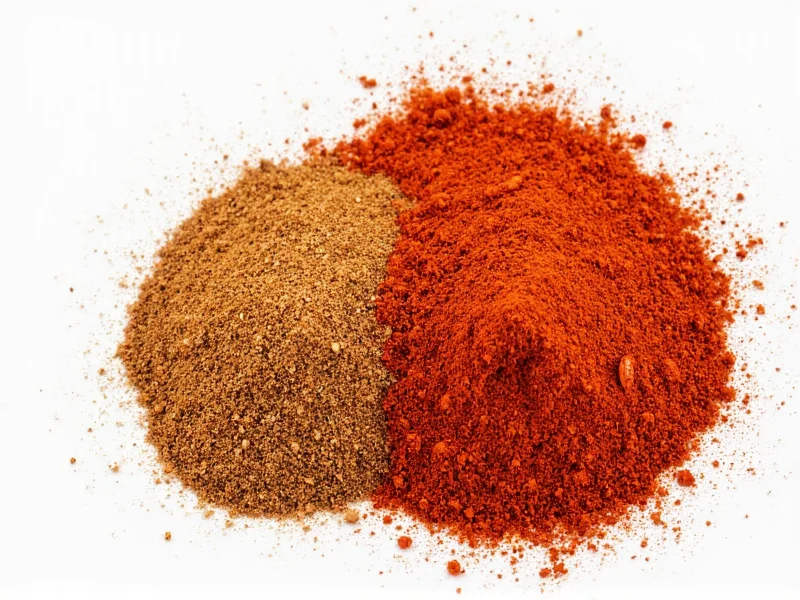When you're in the middle of preparing a Spanish paella, a hearty chili, or a smoky barbecue rub and realize you're out of smoked paprika, knowing reliable alternatives can save your dish. Smoked paprika, or pimentón, provides a distinctive sweet, smoky flavor that's difficult to replicate exactly, but several practical substitutes work well depending on your specific culinary application.
Understanding Smoked Paprika's Unique Flavor Profile
Before exploring substitutes, it's essential to understand what makes smoked paprika special. Made from peppers smoked over oak fires then ground into powder, it delivers three key elements: mild heat (depending on variety), sweet pepper flavor, and distinctive wood-smoke aroma. The smoking process creates complex compounds that give dishes that characteristic campfire essence found in Spanish and Hungarian cuisines.
Top 5 Practical Substitutes for Smoked Paprika
1. Regular Paprika Plus Liquid Smoke
This combination most closely mimics smoked paprika's flavor profile. Use equal parts sweet or hot paprika (depending on your recipe's heat requirements) plus a few drops of liquid smoke. Start with 1/4 teaspoon liquid smoke per tablespoon of paprika, then adjust to taste. This substitute works particularly well for substituting smoked paprika in chili recipes where you need both pepper flavor and smoke.
2. Chipotle Powder
Made from smoked and dried jalapeños, chipotle powder delivers both heat and smoke. Use approximately half the amount of chipotle powder compared to smoked paprika since it's significantly hotter. This substitute shines in barbecue rubs and Tex-Mex dishes but may overpower delicate Spanish recipes. For those seeking a spicy alternative to smoked paprika, this is your best option.
3. Smoked Salt
When your recipe already contains paprika or other peppers, smoked salt can provide the missing smoke element without altering the color. Substitute 1/2 teaspoon smoked salt for every 1 teaspoon of smoked paprika. This works exceptionally well as a smoked paprika substitute for finishing dishes like roasted vegetables or grilled meats.
4. Paprika and Smoked Cumin Blend
Combine equal parts sweet paprika with a small amount of smoked cumin (start with 1/4 teaspoon smoked cumin per tablespoon of paprika). This blend works particularly well for substituting smoked paprika in Spanish recipes where you need that distinctive Iberian flavor profile without overwhelming heat.
5. Pimentón de la Vera
If you're specifically looking for an authentic Spanish smoked paprika alternative, seek out pimentón de la Vera, which comes in three varieties: dulce (sweet), agridulce (bittersweet), and picante (spicy). While technically the same product, different brands may have slightly varying smoke levels that could work as alternatives if your preferred brand is unavailable.
| Substitute | Ratio | Best For | Smoke Intensity |
|---|---|---|---|
| Regular paprika + liquid smoke | 1 tbsp paprika + ¼-½ tsp liquid smoke | Chili, stews, marinades | Adjustable |
| Chipotle powder | ½ amount | Barbecue rubs, Tex-Mex | High |
| Smoked salt | ½ tsp per 1 tsp smoked paprika | Finishing dishes, roasted vegetables | Medium |
| Paprika + smoked cumin | 1 tbsp paprika + ¼ tsp smoked cumin | Spanish recipes, paella | Medium |
| Pimentón de la Vera | 1:1 | Authentic Spanish dishes | Varies by brand |
Substitution Guidelines by Culinary Application
Not all substitutes work equally well across different dishes. Consider these specific recommendations when looking for smoked paprika alternatives for specific recipes:
For Chili and Stews
Regular paprika with liquid smoke provides the most balanced substitute. Add the liquid smoke gradually during cooking, tasting as you go. For smoked paprika substitute in beef chili, consider adding a small piece of chipotle pepper in adobo sauce for complex smoke and heat.
For Spanish Paella and Rice Dishes
A blend of sweet paprika and a tiny amount of smoked cumin works best here. Authentic Spanish recipes suffer when using overly smoky substitutes, so err on the side of less smoke. For the most accurate substitute for smoked paprika in paella, seek out Spanish pimentón if possible.
For Meat Rubs and Barbecue
Chipotle powder shines in these applications. Combine with regular paprika if you need to moderate the heat while maintaining smoke flavor. This creates an excellent barbecue rub substitute for smoked paprika that delivers both complexity and heat.
For Deviled Eggs and Dips
Smoked salt provides just the right touch of smoke without altering the color or texture. This makes it the ideal substitute for smoked paprika in deviled eggs where appearance matters as much as flavor.
When Substitutes Fall Short
Some dishes truly require authentic smoked paprika. Traditional Spanish recipes like patatas bravas or Hungarian goulash lose their distinctive character with substitutes. If you frequently cook these dishes, consider buying smoked paprika in larger quantities or storing it properly (in an airtight container away from light) to extend its shelf life up to six months.
Creating Your Own Smoked Paprika Substitute Blend
For those seeking a versatile homemade smoked paprika alternative, try this customizable blend:
- 2 tablespoons sweet paprika
- 1/2 teaspoon garlic powder
- 1/4 teaspoon liquid smoke (or 1/2 teaspoon smoked salt)
- Pinch of cayenne (optional, for heat)
Mix thoroughly and store in an airtight container. Adjust the liquid smoke incrementally until you achieve your preferred smoke level. This blend works particularly well as a smoked paprika replacement for everyday cooking where authenticity isn't paramount but flavor complexity matters.











 浙公网安备
33010002000092号
浙公网安备
33010002000092号 浙B2-20120091-4
浙B2-20120091-4